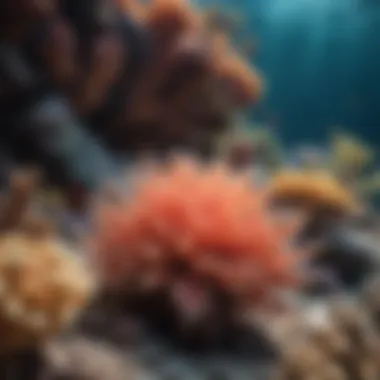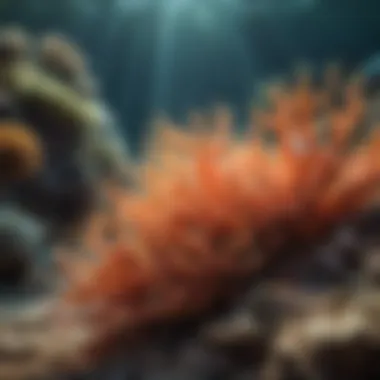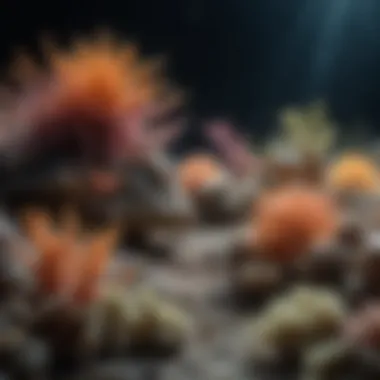Exploring the Complexity of Reefs: A Detailed Analysis


Overview of the Topic
Reefs, an essential environmental feature, play a crucial role in marine ecosystems worldwide. These intricate formations, such as coral reefs found deep in the oceans and vibrant tropical reefs bustling with life, form the foundation of diverse marine habitats. The significance of reefs extends beyond their beauty, as they contribute immensely to marine biodiversity and ecosystem productivity.
Current Status and Challenges
The current status of reefs reveals a sobering reality marred by various threats. Factors such as climate change, ocean acidification, overfishing, pollution, and destructive fishing practices pose significant challenges to reef ecosystems. These threats endanger the delicate balance of marine life sustained by reefs, risking the loss of valuable habitats and species diversity.
Sustainable Solutions
Efforts to address the challenges facing reefs involve the implementation of sustainable practices and innovative solutions. Conservationists and researchers are exploring coral reef restoration techniques, marine protected areas, sustainable fishing practices, and community-based initiatives to safeguard reef ecosystems. Successful case studies highlight the effectiveness of these strategies in promoting ecosystem resilience and biodiversity conservation.
Impact and Importance
The impact of reefs transcends ecological boundaries, affecting not only marine ecosystems but also coastal communities and future generations. Healthy reefs serve as protective barriers against coastal erosion and natural disasters, supporting fisheries, tourism, and local livelihoods. Emphasizing the importance of conservation, these vital ecosystems underscore the need for sustainable resource management and collective action to preserve marine biodiversity and ensure a resilient future for reefs and the interconnected ecosystems they support.
Introduction
Reefs stand as intricate ecosystems that play a vital role in marine biodiversity. This article embarks on a journey through the complexities of reefs, shedding light on their critical significance, the rich tapestry of life they support, imminent dangers they face, and the ongoing efforts to ensure their preservation. From the vibrant coral reefs adorning the ocean floors to the diverse tropical reefs bustling with activity, this piece provides a detailed exploration of these remarkable underwater worlds.
Defining Reefs
Reefs, characterized by their diverse and colorful marine life, are massive underwater structures typically composed of coral. These formations serve as natural habitats for countless species, offering shelter, food, and breeding grounds. The intricate structure of reefs provides a foundation for the elaborate ecosystems that thrive within them, making reefs crucial components of the marine environment.
Significance of Reefs


The significance of reefs transcends their aesthetic beauty; they are key players in maintaining the health of our oceans. Reefs contribute significantly to global biodiversity, supporting a myriad of organisms from tiny fish to majestic sea turtles. Moreover, they act as barriers against coastal erosion, protecting shorelines and communities from the brunt of powerful ocean forces. The economic value of reefs through tourism and fisheries underscores their importance for local economies and livelihoods.
Overview of Reef Types
Reefs come in various forms, each uniquely adapted to its environment. Coral reefs, the most well-known type, are built by colonies of coral polyps over centuries. Mangrove reefs, found in tropical coastal areas, are characterized by their dense mangrove tree formations that provide shelter for a variety of marine life. Atolls, circular coral reef formations enclosing a lagoon, present a fascinating spectacle of natural engineering. Understanding the different types of reefs enhances our appreciation for the diverse ecosystems supported by these structures.
Ecological Importance
Reefs play a pivotal role in supporting marine ecosystems and are crucial for the sustainability of underwater life. Their significance extends beyond their physical structure to encompass a multitude of ecological functions. These intricate ecosystems act as biodiversity hotspots, fostering a vast array of marine species and promoting genetic diversity. Additionally, reefs provide essential ecosystem services, such as shoreline protection, nutrient cycling, and carbon sequestration. Their role in marine food chains is fundamental, with many species relying on reefs for shelter, food, and breeding grounds. Understanding the ecological importance of reefs is paramount to appreciating their value in maintaining healthy marine environments.
Biodiversity Hotspots
Reefs are renowned for their incredible biodiversity, housing a wide variety of plant and animal species. These ecosystems support an intricate web of life, with each species playing a vital role in the ecosystem. The diversity found within reefs not only enriches marine ecosystems but also contributes to the resilience of these habitats. From vibrant coral reefs to bustling tropical reefs, these hotspots are teeming with life and provide researchers with a treasure trove of biological discoveries.
Ecosystem Services Provided by Reefs
Reefs offer a myriad of ecosystem services that are indispensable to both marine life and humans. One of the critical services provided by reefs is coastal protection, where they act as barriers against storms and erosions, safeguarding coastal communities. Additionally, reefs support fisheries by providing breeding grounds and habitats for numerous fish species. Moreover, reefs contribute to nutrient cycling and water filtration, enhancing water quality in the surrounding areas. Recognizing the essential ecosystem services that reefs deliver is crucial for their conservation and sustainable management.
Role in Marine Food Chains
Reefs are integral components of marine food chains, supporting a complex network of interactions among various organisms. Primary producers, such as algae and corals, form the foundation of the food chain by converting sunlight into energy. Herbivores consume these primary producers, while carnivores feed on herbivores and other smaller organisms. Ultimately, the apex predators regulate the populations of lower trophic levels, maintaining balance within the food chain. The interconnectedness of species within marine food chains highlights the fundamental role that reefs play in sustaining marine life and promoting ecosystem stability.
Threats to Reefs
Threats to reefs are a critical aspect discussed in this comprehensive exploration of the complexities surrounding these ecosystems. The impact of various factors on reef health and sustainability is a pressing concern that requires attention. Understanding the implications of these threats is vital for implementing effective conservation strategies to safeguard these vulnerable environments.


Climate Change Effects
The effects of climate change on reefs are profound and far-reaching. Rising sea temperatures, ocean acidification, and extreme weather events pose significant challenges to the delicate balance of reef ecosystems. Corals, the building blocks of reefs, are particularly sensitive to these changes, leading to mass bleaching events and coral mortality. Addressing the underlying causes of climate change is imperative to mitigate its damaging effects on reef habitats.
Pollution Impact
Pollution, whether from land-based sources or marine activities, exerts detrimental effects on reef health. Runoff carrying sediments, chemicals, and plastics can smother corals, disrupt marine life, and degrade water quality. Oil spills and marine debris further compound these issues, causing long-lasting harm to reef ecosystems. Implementing strict regulations, promoting sustainable practices, and fostering community engagement are crucial in combating the pervasive threat of pollution to reefs.
Overfishing and Destructive Practices
Overfishing and destructive practices pose significant threats to reef ecosystems by depleting fish populations, disrupting food webs, and damaging critical habitats. Unsustainable fishing methods such as blast fishing, cyanide fishing, and bycatch contribute to the degradation of reef biodiversity. Tackling overfishing requires effective fisheries management, enforcement of regulations, and the promotion of sustainable fishing practices to ensure the long-term viability of reef ecosystems.
Conservation Efforts
Conservation efforts play a pivotal role in safeguarding the delicate balance of reef ecosystems. In the realm of reef preservation, these initiatives serve as the backbone of ensuring the longevity and resilience of these biodiverse havens. One of the fundamental components of conservation efforts is the establishment of Marine Protected Areas (MPAs), which act as sanctuaries for marine life. By delineating specific zones where human activities are regulated, MPAs create safe havens where marine species can thrive without facing the perils of overexploitation, habitat destruction, or pollution.
Marine Protected Areas
Marine Protected Areas (MPAs) are essential tools in reef conservation. These designated areas are crucial for preserving marine biodiversity and protecting sensitive habitats within reefs. MPAs come in various forms, such as no-take zones, where fishing and extraction activities are prohibited, and multi-use zones, where sustainable human activities are allowed. Through strict regulations and enforcement, MPAs serve as refuges for endangered species, allowing for population recovery and ecosystem preservation. Additionally, MPAs contribute to scientific research, providing valuable insights into reef dynamics and facilitating sustainable management practices.
Coral Reef Restoration Projects
Coral reef restoration projects are instrumental in reversing the damages inflicted upon reefs by human activities and natural disasters. These initiatives involve the cultivation of coral fragments in nurseries, followed by their transplantation onto degraded reef areas. Through meticulous care and monitoring, coral colonies are given a chance to regenerate and rebuild damaged reef structures. By restoring coral populations, these projects help enhance reef resilience, promote biodiversity, and contribute to the overall health of marine ecosystems.
Community Involvement in Reef Conservation


Community involvement plays a vital role in promoting sustainable reef conservation practices. Engaging local communities in reef protection not only raises awareness about the importance of these ecosystems but also fosters a sense of ownership and responsibility among stakeholders. Collaborative efforts between community members, scientists, and conservation organizations lead to the implementation of effective conservation strategies tailored to local needs and challenges. Through educational programs, capacity building, and livelihood opportunities, communities become empowered stewards of reef ecosystems, driving towards long-term preservation and sustainability.
Case Studies
In this section, we delve into the pivotal role of Case Studies in enhancing our understanding of reef ecosystems. By exploring specific instances such as the Great Barrier Reef, Coral Triangle, and Florida Reef Tract, we gain valuable insights into the intricacies and challenges faced by these unique marine environments. Case Studies not only provide a close-up look at the dynamics of reef systems but also offer practical lessons for conservation efforts. Through detailed examinations of these diverse regions, we can identify trends, threats, and potential solutions to safeguard the future of reefs.
Great Barrier Reef
The Great Barrier Reef stands as a global icon of marine biodiversity and resilience. Stretching over 2,300 kilometers along the Australian coast, this intricate ecosystem harbors a kaleidoscope of marine life, including coral, fish, and various invertebrates. However, the Great Barrier Reef faces mounting pressures from climate change, pollution, and invasive species, threatening its delicate balance. Through ongoing monitoring and conservation initiatives, researchers and environmentalists strive to protect this natural wonder and ensure its long-term survival.
Coral Triangle
Situated in the Indo-Pacific region, the Coral Triangle represents the epicenter of marine biodiversity, hosting over 600 coral species and thousands of fish species. This marine hotspot serves as a critical source of livelihood for coastal communities and plays a key role in supporting global ocean health. Despite its ecological significance, the Coral Triangle faces challenges such as habitat destruction, overfishing, and climate change impacts. By studying the dynamics of this region, scientists aim to develop sustainable management strategies to preserve its unmatched biodiversity.
Florida Reef Tract
The Florida Reef Tract, the only coral barrier reef system in the continental United States, spans approximately 360 linear kilometers across the Florida Keys. Home to a diverse array of corals and marine species, this reef system is a vital component of Florida's marine ecosystem. However, like many reefs worldwide, the Florida Reef Tract confronts threats like coral disease, habitat degradation, and water pollution. Conservation efforts focus on enhancing coral resilience, reducing human impacts, and fostering public awareness to ensure the long-term viability of this invaluable reef system.
Future Prospects
In this segment, we delve into the future prospects regarding reefs, offering a speculative view on what lies ahead for these crucial ecosystems. The significance of future prospects cannot be overstated in the context of reef conservation. As we confront escalating environmental challenges, a proactive approach to safeguarding these delicate marine ecosystems is imperative. By considering potential advancements in research, technology, and policy, we aim to pave the way for sustainable reef management and protection. Emphasizing the evolving nature of these ecosystems, there is a pressing need to anticipate and address emerging threats effectively.
Challenges Ahead
Looking forward, we are faced with an array of challenges that pose significant obstacles to the preservation of reefs. These obstacles encompass a broad spectrum, ranging from climate change-induced coral bleaching to the rampant effects of pollution and overfishing. The persistence of these challenges threatens the resilience and vitality of reef ecosystems worldwide. Addressing these challenges demands coordinated efforts on a global scale, involving policymakers, scientists, and local communities in strategic conservation initiatives.
Innovations in Reef Conservation
Innovations in reef conservation represent a beacon of hope in the fight to protect these vulnerable ecosystems. From breakthroughs in coral propagation techniques to the development of marine protected areas equipped with cutting-edge monitoring technology, the realm of reef conservation is witnessing a transformative shift. By harnessing innovation and technology, conservationists are pioneering new approaches to mitigate the impact of threats and promote the recovery of damaged reef systems. These innovative solutions underscore the critical role of science and ingenuity in addressing the complex challenges facing reef ecosystems.
Importance of Public Awareness
Public awareness stands as a cornerstone of effective reef conservation efforts, highlighting the pivotal role that individuals and communities play in preserving these invaluable ecosystems. Educating the public about the value of reefs, the threats they face, and the actions needed to safeguard them is crucial in fostering widespread support and engagement. By cultivating a sense of stewardship and environmental consciousness among the general populace, we can instigate positive behavioral changes and advocacy initiatives that bolster reef conservation endeavors. Recognizing the influence of public awareness in driving meaningful change underscores the significance of a well-informed and mobilized society in securing the future health of reef ecosystems.



